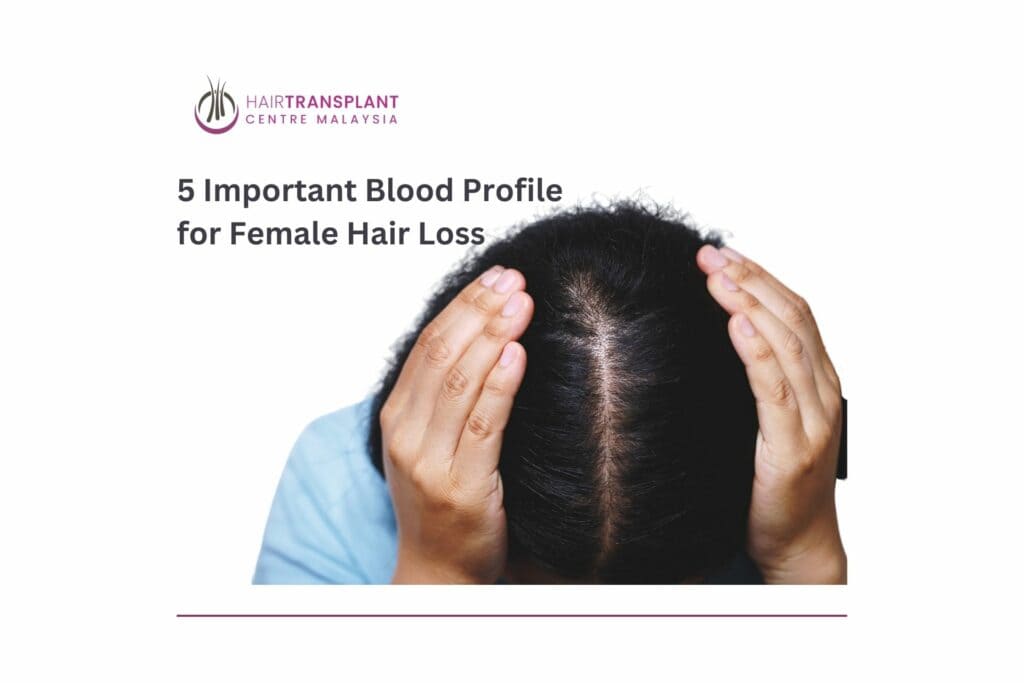5 Important Blood Profile for Female Hair Loss
Women’s hair loss isn’t often as obvious as it is in most males. Hereditary male pattern baldness accounts for around 90% of all instances in men. Hair loss in women, on the other hand, can be caused by a variety of situations and circumstances. The diagnostic tests listed below should be used to assist determine the cause of hair loss. The fact is that these tests generally provide results that are within the normal range for many people, but they can at the very least rule out the potential of specific illnesses causing your hair loss.
It’s vital to note that good female hair loss diagnosis typically begins with an elimination procedure.
Let us call you

Blood Tests: Diagnosing Female Hair Loss
You might get blood tests done with your doctor, and if you’re visiting a Trichologist, please send them a copy of the results so they can discuss them with you. The tests below will reveal a variety of factors that might be causing hair problems:
- Hormone levels (DHEA, testosterone, androstenedione, prolactin, follicular stimulating hormone, and luteinizing hormone)
- Vitamin D as it stimulates hair follicles to grow. A vitamin D deficiency may also be linked to alopecia areata, an autoimmune condition that causes patchy hair loss.
- Thyroid Tests: T-3, T-4, and Thyroid Stimulating Hormone (TSH)
- Iron and Serum Ferritin and Total Iron Binding Capacity (TIBC)
- Hemoglobin/Hematocrit or CBC (Complete Blood Count) Low B12 and Associated Hair loss.
Analyzing Blood Test Results
If you’re concerned about your hair loss and have decided to pursue blood testing as a possible diagnosis, it’s critical that you comprehend the results and their consequences. Ferritin, for example, may have a reference range of 10-130 ug/L (micrograms per liter), yet your findings reveal a level of 30 ug/L. While this amount is acceptable for important organs, ideal ferritin levels for hair should be at least 80 ug/L, and anything less might result in increased hair loss or growth. Other examples include thyroid and hemoglobin levels, which can be fairly complicated.
If you’re losing your hair and have spoken with your doctor but are still worried about your blood tests, you should consult a trichologist. We must not underestimate the influence of excessive or lack of vitamin and mineral supplementation, which, like many prescription drugs, can cause hair loss. Because each person’s metabolic process is unique, it’s hard to forecast how a person’s hair loss and prognosis will turn out. As a result, the severity of the hair loss as well as the potential to recover might fluctuate.
Most types of hair loss will appear 2-4 months after the primary reason. So, if you’re losing your hair, go back to the incident or conditions that may have led to your hair loss.
There are several exceptions to this rule, such as pharmaceuticals that can be given in high dosages, such as those used in cancer treatment chemotherapy. If hair loss occurs within a few days or a week after taking a medication, the culprit is usually something else – possibly the ailment that caused you to seek therapy in the first place. Whether a medicine does cause significant hair shedding, you might ask your doctor if there are any alternative choices.
To understand more, talk to your doctor today.



